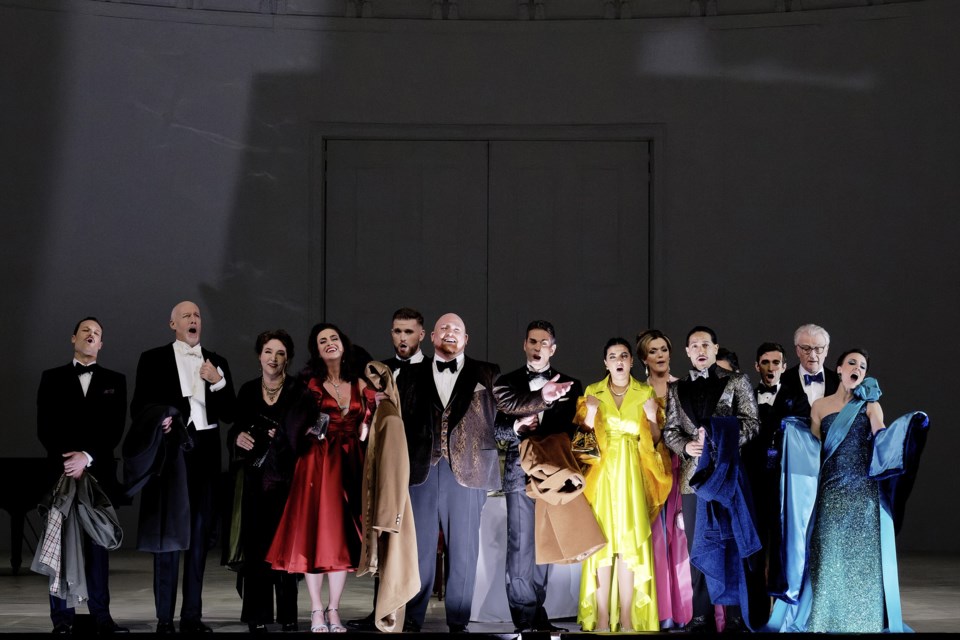added an element to âThe Exterminating Angelâ that and Thomas AdĂšs left out: cannibalism.
AdĂšsâ opera, based on Buñuelâs 1962 film âEl ĂĄngel exterminador,â details psychologically blocked dinner guests who canât depart a mansion and the disintegration of decorum after days of dystopian detachment. Bieitoâs new production opened at on Feb. 29 and runs through March 23.
Buñuel featured sheep who wander the house, then are cooked and eaten. Bieito, a 62-year-old Spanish director known for , sets despairing patricians bingeing on each other's limbs.
âHe just said âI hate sheep. Weâre not having sheep. They are the sheep,ââ AdĂšs said. âI thought, oh, yes, OK. And then it very kind of quickly dawned on me: Oh, God, this means theyâre going to be eating each other. I see where this is going. But itâs not gross or anything.â
Countertenor Anthony Roth Costanzo mimics chomping into his right forearm.
âMineâs a little tough. I prefer it Ă point,â he sings of a French term for âmedium rareâ as the aristocratic Francisco de Ăvila, younger brother of the Duchess Silvia.
âCalixto himself is really steeped in Buñuelâs mindset and context and history,â Costanzo said. âIt was clear to him that we didnât want to replicate the film, but we wanted to make something that represented it and that represented that kind of thinking.â
AdĂšs, a 54-year-old British composer, conducted the first four performances of the run. He compared the mood of his opera to âblue cheese â the subject matter is inherently fetid.â
âHeâs released the beast in the music,â AdĂšs said of Bieito. âSomehow itâs in the music but Iâd never realized it. But when you see it on stage with the music, Iâm afraid it is all too correct.â
Tenor Nicky Spence, who sings the role of dinner host Edmundo de Nobile, had been unfamiliar with Buñuelâs work.
âI was too busy watching rom-coms and fluff. I donât really watch a lot of international films or surreal films because I do that for a living,â he said. âI think it poses a lot of big questions about what life is and what reality is, and the way that we metaphorically close ourselves into rooms on a daily basis.â
Bieitoâs is just the second staging of AdĂšsâ opera following the premiere production by Tom Cairns, who also wrote the libretto. Cairns' vision, also modern but less striking, started in 2016 at the Salzburg Festival and went on the London's Royal Opera, and the Royal Danish Theatre.
In Paris, characters clad in Ingo KrĂŒglerâs colorful evening attire arrive for dinner on Anna-Sofia Kirschâs bare white set. Only a long table, red chairs and a piano are on stage.
During a march between the first and second acts, stark red lighting by Reinhard Traub silhouettes soprano Gloria Tronel (portraying opera singer Leticia Meynar) as she is carried around atop a table in a crucifixion pose.
"I was like: âWell, of course,ââ AdĂšs said. âItâs always been in it.â
Bieito represents sheep with balloons held by a boy. Simulated sex highlights depravity.
âHeâs a force of nature,â said contralto Hilary Summers, who sings Leonora Palma, a dinner guest ailing with cancer. âBasically he gets us all to do the work for him â thatâs his biggest skill, is that he just throws in a bone, and we all run at with like rampant hungry wolves.â
premiered at The Shed in New York last fall titled âHere We Are,â the final musical of the great American composer Sondheim and book writer David Ives adapted âExterminating Angelâ as their show's second half and based the first on a farcical tale of friends failing at finding a place to eat.
The March 9 performance of Bieitoâs darker imagining was recorded on video and will be available for streaming on Medici starting March 22. The story gave food for thought.
âI will say that, Parisian dinners can extend a long time, as they can in New York,â Costanzo said. âThe best story I ever heard of a dinner in New York was that someone had people over to his apartment and left to get something. And when he left, the door handle fell off, and the entire party was stuck in the room.â
Costanzo identified that host only as an arts patron.
Spence laughed at the opera's comparison of art and life.
âPeople tend to get out alive at my dinner parties,â he said, âbut I suppose Iâve been at some bad dinner parties where they feel like theyâre going on interminably.â
Ronald Blum, The Associated Press




